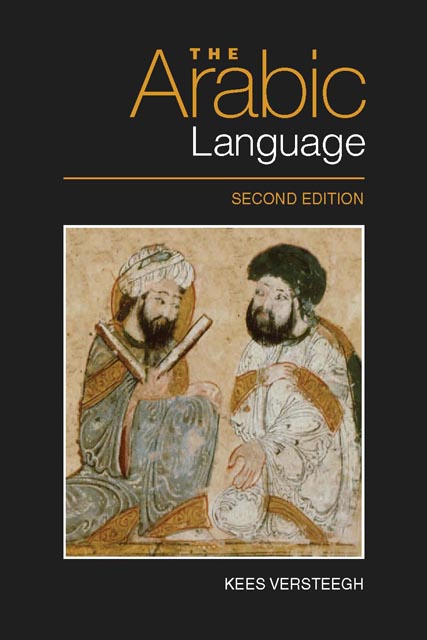Book contents
- Frontmatter
- Contents
- Preface to First Edition
- Preface to Second Edition
- List of Figures and Maps
- List of Tables
- Note on Transcription and Glossing
- 1 The Study of Arabic in the West
- 2 Arabic as a Semitic Language
- 3 The Earliest Stages of Arabic
- 4 Arabic in the Pre-Islamic Period
- 5 The Development of Classical Arabic
- 6 The Structure of Arabic
- 7 The Arabic Linguistic Tradition
- 8 The Emergence of New Arabic
- 9 Middle Arabic
- 10 The Study of the Arabic Dialects
- 11 The Dialects of Arabic
- 12 The Emergence of Modern Standard Arabic
- 13 Diglossia
- 14 Bilingualism
- 15 Arabic as a Minority Language
- 16 Arabic Pidgins and Creoles
- 17 Arabic as a World Language
- Bibliography
- List of Abbreviations
- Index
10 - The Study of the Arabic Dialects
Published online by Cambridge University Press: 18 November 2022
- Frontmatter
- Contents
- Preface to First Edition
- Preface to Second Edition
- List of Figures and Maps
- List of Tables
- Note on Transcription and Glossing
- 1 The Study of Arabic in the West
- 2 Arabic as a Semitic Language
- 3 The Earliest Stages of Arabic
- 4 Arabic in the Pre-Islamic Period
- 5 The Development of Classical Arabic
- 6 The Structure of Arabic
- 7 The Arabic Linguistic Tradition
- 8 The Emergence of New Arabic
- 9 Middle Arabic
- 10 The Study of the Arabic Dialects
- 11 The Dialects of Arabic
- 12 The Emergence of Modern Standard Arabic
- 13 Diglossia
- 14 Bilingualism
- 15 Arabic as a Minority Language
- 16 Arabic Pidgins and Creoles
- 17 Arabic as a World Language
- Bibliography
- List of Abbreviations
- Index
Summary
The Study of the Arabic Dialects
In the preceding chapters, we have concentrated on thefeatures that the Arabic vernaculars or dialectshave in common as against the Classical Standardlanguage. In that context, we have shown that theyrepresent a different type of Arabic, rather thanjust a modified version of the Classical language.In this chapter and the next the focus will be ondifferences between the dialects, in particular, thegeographical variation and the separation intoseveral dialect areas. The issue of thesociolinguistic variation between the dialects andthe standard language will be reserved for Chapter13.
The systematic study of dialect geography is a typicalinvention of Western European nineteenth-centurylinguistics. But it would be wrong to suppose thatthe Arabs themselves were not aware of the variationin speech in the Arabophone world. We have seenabove that grammarians accepted the variation in thepre-Islamic dialects and even collected thevariants, because in their view these belonged tothe corpus of pure Arabic speech (p. 45). They werenot interested, however, in the urban dialects thatarose all over the empire. In accordance with theirviews on the Arabic language, they regarded these aserroneous and refrained from mentioning them intheir writings. But those outside the grammaticaltradition did show an interest in the linguisticdifferences between the various parts of the empireand their causes. At an early date, al-Jāḥiẓ (d.255/868) informs us that ‘the people in the citiestalk according to the language of the Bedouinimmigrants that had settled there, which is why youfind lexical differences between the people of Kūfaand Baṣra and Syria and Egypt’ (wa-ʾahl al-ʾamṣār ʾinnamā yatakallamūna ʿalāluġat an-nāzila fīhim min al-ʿArab, wa-li-ḏālikatajidu l-iḫtilāf fī ʾalfāḏ̣ min ʾalfāḏ̣ ʾahlal-Kūfa wa-l-Baṣra wa-š-Šām wa-Miṣr)(al-Bayānwa-t-tabyīn, I, ed. as-Sandūbī, Beirut,n.d., p. 38). In Kūfa, he adds, the immigration ofPersians to the city brought in a number of Persianwords: the inhabitants of this city say jahār-sūj (Persian čahār ‘ four’ + sū(j) ‘ road’) where theBasrans say marbaʿafor a crossroads, and they use words such as ḫiyār instead of qiṯṯāʾ ‘ cucumber’, andwāzār instead ofsūq ‘market’(Persian ḫiyār,bāzār).
- Type
- Chapter
- Information
- The Arabic Language , pp. 172 - 191Publisher: Edinburgh University PressPrint publication year: 2014

